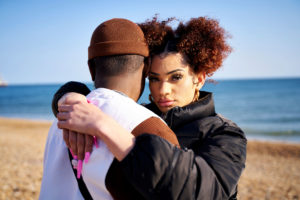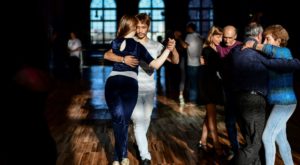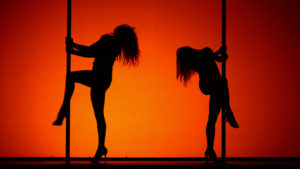Before scooping up your grandson, niece, or little cousins for a hug this holiday season, the internet would like you to know: “Kids who think they need to comply with adult requests for affection are more likely to be sexually abused.” This warning is the punchline of a recent article entitled “Why You Should Never Make Your Child Hug Anyone”. It’s representative of a miserable discourse that briefly relented during the elbow-bumping days of the pandemic, but has otherwise spilled over regularly in the past decade. The Today show has featured a therapist mom who won’t even hug her own kids without consent, while the Girl Scouts of America trotted out the topic in 2017 as a sort of #MeToo movement for kids —#MommyAndMeToo, perhaps?
This new festive tradition, where we tell our wizened elders to piss off and keep their grubby hands and lips to themselves, obviously has its roots in the all-consuming contemporary dialogue about consent. But this holiday season it hits differently. Rejoice, for gone are the grim days of socially distanced drive-by birthday parties and Thanksgiving over FaceTime; once again, Grandma can be treated like an avatar for child molesters the world over right to her face. The recirculation of articles like these coincides with another notable entry into the every-touch-is-a-bad-touch canon, triggered by a recent update on the MeTooing of author Junot Diaz. Diaz, a Pulitzer-winning fiction writer, was mostly (not fully) cancelled in 2018, after an accusation from writer Zinzi Clemmons that he had once “cornered” and “forcibly kissed” her. Accounts of verbal abuse and interpersonal cruelty from other women swiftly followed, along with rumours that dozens of additional allegations were coming down the pike — or would, if not for the victims’ fears of retaliation for speaking out. As summarised by Ben Smith of Semafor, a media firestorm ensued: “Publications from The Washington Post to New York Magazine ran with headlines about allegations of ‘sexual misconduct’.”
The bombshell, four years later, is a heretofore-unreported revelation in Smith’s article: that the kiss in question was not the open-mouthed, tongue-thrusting assault most readily conjured by the word “forcible”, but a peck on the cheek. Yet for every person who was thrown for a loop by this information, there was another just as willing to die on the hill of “A kiss on the cheek without explicit prior consent is assault, actually”. In the former category was the writer Thomas Chatterton Williams, tweeting bewilderedly: “Imagine getting up and preparing to publicly accuse someone of assault and knowing full well that what you were actually referring to was a kiss on the cheek.” In the latter category was Diaz accuser Monica Byrne (who described a public but heated dinner party conversation with the author as “verbal sexual assault”), as well as recently-fired Washington Post reporter Felicia Sonmez, herself one of the #MeToo movement’s more controversial figures.
Needless to say, such assertions might (and did) invite a certain amount of snark (France, anyone?) — but there’s also a sober, and sobering, discussion to be had about what this all means in a diverse, high-trust society. The planet is presently home to more than eight billion people, and some fraction of these are bound to behave in ways that are grating to some fraction of the other eight billion; the cultural norms surrounding a kiss-kiss greeting notwithstanding, the world is also full of close talkers, arm-touchers, people who spit a little when they get excited. Annoying? Yes. Within tolerable limits of human diversity? Ah, well, they used to be.
But that was before we became so accustomed to the total elimination of quotidian friction from our lives that even the most fleeting moment of irritation or discomfort began to feel like a tragedy. This is not the first time I’ve observed that the notion of a voicemail as a violation arose roughly in tandem with our ability to use an app to replace an ever-growing list of interactions, but it did. The lack of an online option has become so unusual that when I discovered a local pizza place that still takes orders exclusively by phone call, it felt like an aggressive albeit implicit declaration that those under the age of 35 should get their pepperoni-and-stinger pies elsewhere.
There’s a metaphor here about sensitivity, vulnerability, and how insulating oneself in a bubble can yield the opposite of the desired result, except that the metaphor is lately made real: the US, like many other countries, is currently weathering a wave of infections from all the diseases we didn’t get for two years while we were hiding out, trying not to get Covid. (In the UK, the surge in cases of Strep A among kids has been attributed to the fact that they weren’t allowed to mix in lockdown.)
This was entirely predictable, and yet a remarkable number of people seem to believe that the solution is not to resume normal life and regain normal immune function, but to make our socially-distanced and sanitised bubbles a permanent state of affairs. Some of America’s top pandemic pundits are begging us to bring back masks and other distancing measures, while others appeared to praise China’s draconian Zero Covid strategy, even as the country was rocked by protests. In Los Angeles, home to a particularly relentless public health apparatus, a mandate remains in place that if a person has been infected with Covid, everyone in the household must wear masks at all times, including at home. It is a new vision of normal: Safer. Healthier. Cleaner. Lonelier.
Here the fear of Covid becomes difficult to disentangle from the creeping influence of consent as a framework to govern any interaction in which another person might hug you, touch you, or breathe on you. There’s a sense that if we just create enough rules, enough boundaries — confining every visit, every conversation, every human interaction sexual and non-sexual, within a set of strict limitations — the ordinary discomforts of coexisting with other people could be eradicated.
It does, however, have the peculiar side effect of making every instance of physical touch both existentially fraught and sexually tinged. This is not just about the inexpressible, ugly weirdness of kids being instructed that it’s okay to recoil from Grandma because her hugs are non-consensual (while Grandma is in turn instructed that if her feelings are hurt, she’s guilty of the same horny entitlement that leads men to commit sex crimes). It’s about the pathologising of normal human togetherness, and the normalising of an extremely online brand of misanthropy, all with the pretence that this is the only way to be a decent human being, the only way to show you care.
One of the most remarkable responses to the Junot Diaz cheek kiss was: “It’s okay not to want any intrusions into one’s space and that should be in fact, the standard.” It’s the “standard” that gets me, which if implemented would establish those of us who enjoy physical contact as deviations if not deviants, in need of stern correction. But this idea, so strange by ordinary measures, became truly ascendant during the pandemic: that the emergency-induced state of isolation is better, actually, both scientifically and morally. That we should, indeed, recalibrate society in accordance with the preferences of the most anti-social people in it, the ones who don’t especially like or trust other human beings, the ones who don’t want people in their space. You’d think the paradox of this would be cause for reflection. Reorganising society per the preferences of the anti-social seems, at the very least, a self-contradictory endeavour — on the same level as putting a vegan in charge of the menu for your Festival of Meats. And yet, the beat goes on.
Much has been made in recent weeks of a study showing that Americans now spend an increasing amount of time alone. This was a trend exacerbated by the pandemic but not original to it. I suspect it has been taking root for at least as long as the social web has existed, or perhaps longer, dating to that first moment at which the internet turned society’s shut-ins from solo hermits into a global community — a community with an outsized voice, owing to the propensity of its members to never not be online.
The writing of our impending isolation was surely on the wall amid the unofficial introvert awareness movement of the early 2000s, which led to a Tumblr-fuelled fetishisation of solitude that turned pathological reclusiveness into a point of pride, even an identity. (Sure, sex is great, but have you ever canceled your plans and stayed home on a Saturday night wearing fluffy socks?) Granted, the meme-ified introvert persona was in many cases indistinguishable from a person with clinical depression, but dressing up social withdrawal as an adorable and extremely online personality quirk made it all but impossible to criticise. Those who found it alarming just didn’t understand; they were probably (ew) extroverts.
It’s that frictionlessness again: here is a social milieu where everything from intellectual debates to sexually-charged banter can be shut down at the literal click of a button. Where there’s no threat of folks touching you, breathing on you, or noticing that you’re not wearing pants. Where other people are not only not in your space but cannot be, ever.
Is this better? We certainly tried to convince ourselves as much, in those long months when staying in went from choice to necessity. In addition to fear and stress and Tiger King on Netflix, the pandemic was characterised by an almost frantic forced enthusiasm for the concept of being alone together, the operative word being alone. Browsing the art museum’s collection online was all the culture, without the crowds. Streaming services introduced “group-watch” features to replace going to the movies; rowdy trivia nights at the local pub turned into sterile (but safe!) late-night Zoom affairs. Anything you could do in the real world, you could do better in virtual space: happy hours, birthday parties, conferences. School, work, therapy. Funerals. Especially funerals, given what a veritable minefield they are of both germs (all that sniffling and sobbing) as well as all kinds of nonconsensual hugging and hand-clasping.
In trying to persuade ourselves of the superiority of a socially distant life, we gave our most anti-social tendencies not just a pass but the imprimatur of moral authority. And while the threat of Covid has receded, this new paradigm has not. As recently as two months ago, the advice given in a national newspaper to a person whose continuing reluctance to socialise indoors had left her struggling under “waves of misery and loneliness” was to recast herself in her own mind as a heroic martyr to the cause: “It might help to see your decisions as marks of solidarity with people who do have underlying conditions,” wrote the Guardian‘s columnist. “If you can see these things as badges of consideration for the people most hurt by the pandemic, it might be something you feel happier to be conspicuous for.”
I wonder if it helped this woman even a little to be told that her aching loneliness was actually a badge of honour, that the best way to show her care for other people was to hide herself away from them. I wonder what kind of person would be comforted by this. And I wonder: until when? Having successfully flipped the script so that those who yearn for human contact became the avatar for destructive selfishness, while the recluses in their hermetically-sealed bubbles are the heroes holding society together, how are we meant to come together again?
An introvert and a misanthrope are two different things, but the discourse around how we should live now leaves little distinction between the two. The question of how the lines became so blurred is one thing. The question of how to rediscover the distinction, let alone rediscover the goodness of gathering, of holding each other close, and of refusing to abandon each other to the sanctified isolation of eternal quarantine, should perhaps be answered first.
***
Order your copy of UnHerd’s first print edition here.
Disclaimer
Some of the posts we share are controversial and we do not necessarily agree with them in the whole extend. Sometimes we agree with the content or part of it but we do not agree with the narration or language. Nevertheless we find them somehow interesting, valuable and/or informative or we share them, because we strongly believe in freedom of speech, free press and journalism. We strongly encourage you to have a critical approach to all the content, do your own research and analysis to build your own opinion.
We would be glad to have your feedback.
Source: UnHerd Read the original article here: https://unherd.com/





